Replacing beef with a different protein — even for just one meal — can cut the emissions footprint of a person’s diet that day by as much as half.
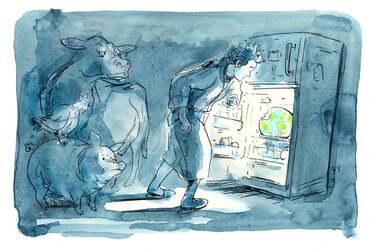
Food systems are responsible for 30% of human-caused emissions, and nearly 60% of that comes from animal products. Illustrations: Graham Roumieu/Bloomberg
By Zahra Hirji
February 21, 2024 at 10:00 AM UTC
Next time you’re out for lunch, try playing a little game: Without looking it up, can you find the most and least climate-friendly options on the menu?
Unlike a meal’s price, the greenhouse-gas footprint of food isn’t typically spelled out. But you don’t need to ask a climate scientist to find out either. There’s one simple trick for identifying the highest impact item on almost any menu: If there’s beef, that’s probably it.
Of course, maybe that’s not enough to change your order — sometimes you just want a good steak taco. Maybe you don’t think the climate impact of any given meal matters in the grand scheme of things. Here, too, there’s a simple rule of thumb: Cutting back on beef makes a big difference. One 2022 study in the American Journal of Clinical Nutrition found that swapping out beef for a single meal can reduce a person’s carbon footprint for that day by almost half. The more people who embrace such swaps, the bigger the dent in food-related emissions. There may even be health benefits, too.
“You don’t have to become a vegan to have a big impact on your carbon footprint,” says Diego Rose, a professor and director of the nutrition program at Tulane University. “You just have to swap out beef.”
Food systems are responsible for roughly 30% of human-caused emissions globally, according to a 2021 study in Nature Food. Other research suggests that nearly 60% of that comes from animal-based products, which is largely a result of the land used for livestock — clearing forests and vegetation has a huge emissions impact — and the land and fertilizer needed to grow animal feed.
“All animal foods have a higher footprint than plant foods,” says Rose, because “you have to produce plant foods first and then feed it to the animals.”
Beef’s footprint is especially outsized. For one, there are roughly 1.5 billion cows on the planet. About 13 million square kilometers (3.2 billion acres) of land is used to raise all that cattle, along with buffalo, and their food — one-quarter of all land used for agriculture, according to a 2017 paper in Global Food Security. Then there’s the methane. Cows and other ruminants have a unique digestive system that allows them to turn grass into fuel, but in the process their special gut bacteria releases methane, a greenhouse gas 80 times more potent than carbon dioxide in the short term.
There is no universal figure for beef’s emissions impact, which varies by region, type of farm, grazing habits and other factors. But dozens of studies identify beef as among the most egregious emitters. Emissions from beef herd production alone typically range from about 79 to 101 kilograms of carbon dioxide equivalent per kilogram of edible weight, according to one paper. That compares with 3 to 21 kilograms of CO2e for the full supply chain of chickens, including production. (Dairy cows’ emissions from production come in at 8 to 75 kilograms of CO2e, lower because they’re shared across both meat and dairy products.)
Globally, “ruminant meats produce about seven times as much emissions and use about seven times as much land as chicken and pork to consume the same amount of protein,” says Raychel Santo, a food and climate research associate at the nonprofit World Resources Institute. “They use about 20 times as much land and produce about 20 times as much emissions as lentils and beans.”
It doesn’t help that humans eat a lot of beef. Back in 1961, some 28 million tons of cattle and buffalo meat was produced globally, according to the United Nations’ Food and Agriculture Organization (FAO). By 2022, that had more than doubled to about 76 million tons. It’s projected to grow further as the world’s population swells.
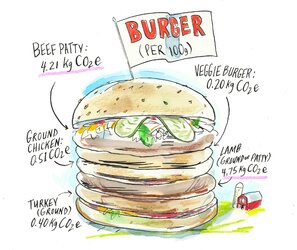
Data source: 2023 Nature Food study on diet swaps. Illustrations: Graham Roumieu/Bloomberg
The US has historically led that charge. Americans consumed roughly 485 grams (17 ounces) of beef per person each week last year, according to the Department of Agriculture. US dietary guidelines don’t include specific recommendations for red meat, despite a number of studies linking higher consumption levels with an increased risk of type 2 diabetes, heart disease and certain cancers. But health and climate experts at the EAT Lancet Commission recommend people consume no more than 98 grams (3.5 ounces) of red meat per week.
“In the US, most of us eat more beef than what’s considered healthy for us,” says Stephanie Roe, a climate and energy lead scientist at the nonprofit World Wildlife Fund. “So that’s low-hanging fruit because then we can improve our health outcomes in addition to environmental ones.”
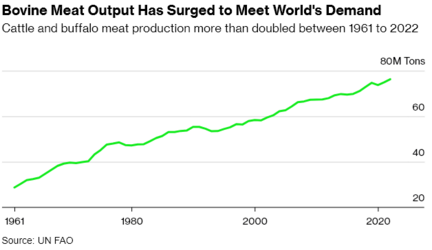
Per capita beef consumption is starting to slow in some places, including the US and the European Union. It’s also projected to decline in many parts of the world over the next decade, according to a 2023 outlook from the Organisation for Economic Co-operation and Development and the FAO. In the Asia-Pacific region, though, beef consumption is projected to keep climbing.
One response to the beef conundrum is to tinker with the cows. There’s a growing field of research geared at reducing ruminants’ methane output, whether by including seaweed, biochar and other additives in their feed or designing masks to capture their burps. Other solutions focus on improving breeding for cows that release less methane or reducing the amount of land being cleared for ruminant production.
Another option is to cut meat out of diets entirely. There’s no question that vegans and vegetarians have a smaller food-related carbon footprint than people who consume meat and dairy. But that’s a hard sell in many countries — in the US, only 5% of people identify as vegan or vegetarian — and policymakers often avoid prescriptive guidance for fear of framing climate action as sacrifice.
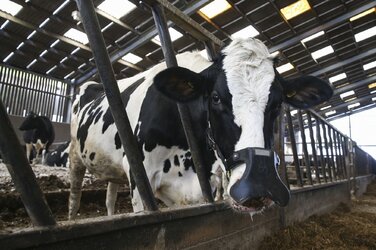
A dairy cow fitted with a wearable methane-reducing mask developed by Zelp Ltd. Photographer: Hollie Adams/Bloomberg
The lack of US policy in particular is what inspired Rose at Tulane to start digging into diets. “[Sometimes] people do want to act,” he says, “and sometimes by people acting, that pushes governments to actually realize there’s a problem.”
Rose and his colleagues started by looking at records of what nearly 17,000 adults across the US recalled eating in the previous 24 hours, collected by the Centers for Disease Control and Prevention between 2005 and 2010. They calculated the emissions associated with producing and manufacturing each item — the bulk of a food’s carbon footprint — and then tallied up the emissions from each recorded daily diet.
The findings were clear: What differentiated people whose diets had a higher carbon footprint was “one or two items of beef on a given day,” Rose says. The highest-impact foods “were all beef items.”
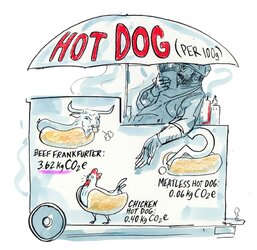
Data source: 2023 Nature Food study on diet swaps. Illustrations: Graham Roumieu/Bloomberg

Data source: 2023 Nature Food study on diet swaps. Illustrations: Graham Roumieu/Bloomberg
The study also set out to determine the impact of swapping out meat, and in particular beef, for an alternative. The researchers identified less climate-intensive food equivalents — pork spare ribs instead of beef short ribs, for example — and calculated the change in daily food-related emissions. They found that even small reductions in meat consumption, especially beef, added up quickly.
In follow-up research published in Nature Food last year, Rose and others took the swap concept a step further by looking at other high-impact swaps across food groups, broken down into four categories: proteins, mixed foods, non-alcoholic beverages and dairy. The researchers used 2015 and 2016 dietary recall data reported by almost 8,000 adults and children to the CDC.
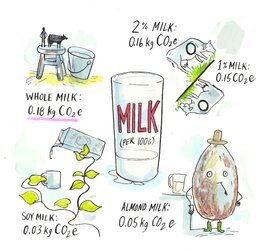
Data source: 2023 Nature Food study on diet swaps. Illustrations: Graham Roumieu/Bloomberg
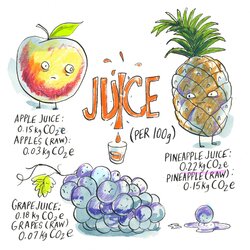
Data source: 2023 Nature Food study on diet swaps. Illustrations: Graham Roumieu/Bloomberg
“If you have a choice between red meat and chicken or vegetarian, the chicken or vegetarian is going to have a lower carbon footprint and, on average, will also be healthier,” says Anna Grummon, director of the Stanford Food Policy Lab and a co-author on the Nature Food study.
Other meaningful swaps include switching out juice for whole fruit, and replacing dairy milk with non-dairy alternatives like soy or almond milk. (The data pre-dated the rise of oat milk.)
The study didn’t account for every aspect of a food’s carbon footprint: It stopped short of including transportation, or emissions from food waste. To truly understand the environmental impact of swaps, it’s important to also consider what they mean for water use, land use, biodiversity loss and other environmental issues. (Almond milk, for example, uses more water than cow’s milk.) But the study does do one thing incredibly well, Rose says: It makes “a good argument for how small and incremental dietary changes through substitution can make a large overall impact.”
Source (Archive is broken)